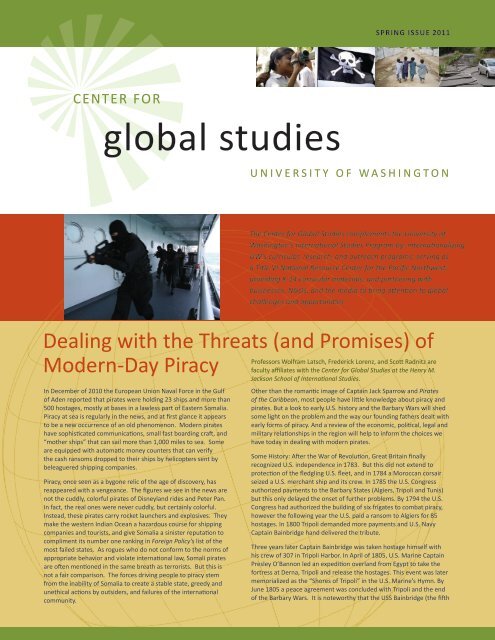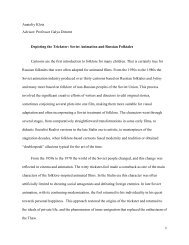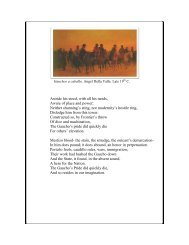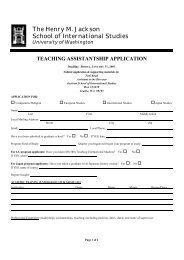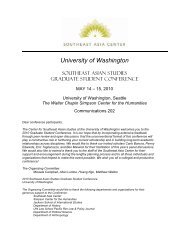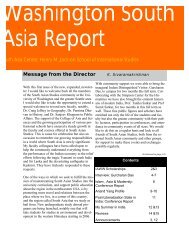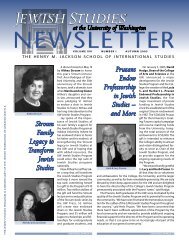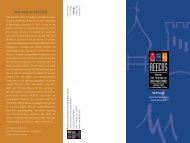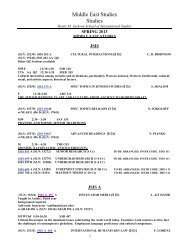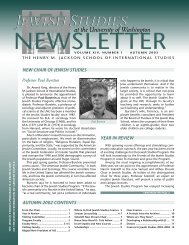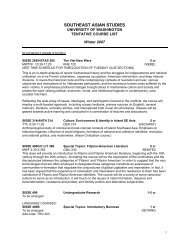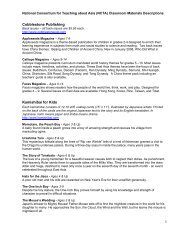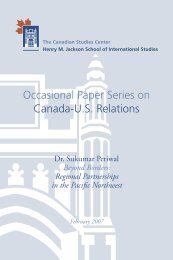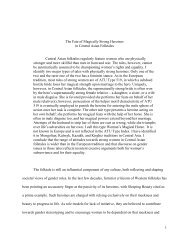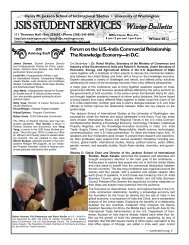global studies - Jackson School of International Studies - University ...
global studies - Jackson School of International Studies - University ...
global studies - Jackson School of International Studies - University ...
Create successful ePaper yourself
Turn your PDF publications into a flip-book with our unique Google optimized e-Paper software.
CENTER FOR<br />
<strong>global</strong> <strong>studies</strong><br />
In December <strong>of</strong> 2010 the European Union Naval Force in the Gulf<br />
<strong>of</strong> Aden reported that pirates were holding 23 ships and more than<br />
500 hostages, mostly at bases in a lawless part <strong>of</strong> Eastern Somalia.<br />
Piracy at sea is regularly in the news, and at first glance it appears<br />
to be a new occurrence <strong>of</strong> an old phenomenon. Modern pirates<br />
have sophisticated communications, small fast boarding craft, and<br />
“mother ships” that can sail more than 1,000 miles to sea. Some<br />
are equipped with automatic money counters that can verify<br />
the cash ransoms dropped to their ships by helicopters sent by<br />
beleaguered shipping companies.<br />
Piracy, once seen as a bygone relic <strong>of</strong> the age <strong>of</strong> discovery, has<br />
reappeared with a vengeance. The figures we see in the news are<br />
not the cuddly, colorful pirates <strong>of</strong> Disneyland rides and Peter Pan.<br />
In fact, the real ones were never cuddly, but certainly colorful.<br />
Instead, these pirates carry rocket launchers and explosives. They<br />
make the western Indian Ocean a hazardous course for shipping<br />
companies and tourists, and give Somalia a sinister reputation to<br />
compliment its number one ranking in Foreign Policy’s list <strong>of</strong> the<br />
most failed states. As rogues who do not conform to the norms <strong>of</strong><br />
appropriate behavior and violate international law, Somali pirates<br />
are <strong>of</strong>ten mentioned in the same breath as terrorists. But this is<br />
not a fair comparison. The forces driving people to piracy stem<br />
from the inability <strong>of</strong> Somalia to create a stable state, greedy and<br />
unethical actions by outsiders, and failures <strong>of</strong> the international<br />
community.<br />
SPRING ISSUE 2011<br />
UNIVERSITY OF WASHINGTON<br />
The Center for Global <strong>Studies</strong> complements the <strong>University</strong> <strong>of</strong><br />
Washington’s <strong>International</strong> <strong>Studies</strong> Program by: internationalizing<br />
UW’s curricular, research, and outreach programs; serving as<br />
a Title VI National Resource Center for the Pacific Northwest;<br />
providing K-14 curricular materials; and partnering with<br />
businesses, NGOs, and the media to bring attention to <strong>global</strong><br />
challenges and opportunities.<br />
Dealing with the Threats (and Promises) <strong>of</strong><br />
Modern-Day Piracy<br />
Pr<strong>of</strong>essors Wolfram Latsch, Frederick Lorenz, and Scott Radnitz are<br />
faculty affiliates with the Center for Global <strong>Studies</strong> at the Henry M.<br />
<strong>Jackson</strong> <strong>School</strong> <strong>of</strong> <strong>International</strong> <strong>Studies</strong>.<br />
Other than the romantic image <strong>of</strong> Captain Jack Sparrow and Pirates<br />
<strong>of</strong> the Caribbean, most people have little knowledge about piracy and<br />
pirates. But a look to early U.S. history and the Barbary Wars will shed<br />
some light on the problem and the way our founding fathers dealt with<br />
early forms <strong>of</strong> piracy. And a review <strong>of</strong> the economic, political, legal and<br />
military relationships in the region will help to inform the choices we<br />
have today in dealing with modern pirates.<br />
Some History: After the War <strong>of</strong> Revolution, Great Britain finally<br />
recognized U.S. independence in 1783. But this did not extend to<br />
protection <strong>of</strong> the fledgling U.S. fleet, and in 1784 a Moroccan corsair<br />
seized a U.S. merchant ship and its crew. In 1785 the U.S. Congress<br />
authorized payments to the Barbary States (Algiers, Tripoli and Tunis)<br />
but this only delayed the onset <strong>of</strong> further problems. By 1794 the U.S.<br />
Congress had authorized the building <strong>of</strong> six frigates to combat piracy,<br />
however the following year the U.S. paid a ransom to Algiers for 85<br />
hostages. In 1800 Tripoli demanded more payments and U.S. Navy<br />
Captain Bainbridge hand delivered the tribute.<br />
Three years later Captain Bainbridge was taken hostage himself with<br />
his crew <strong>of</strong> 307 in Tripoli Harbor. In April <strong>of</strong> 1805, U.S. Marine Captain<br />
Presley O’Bannon led an expedition overland from Egypt to take the<br />
fortress at Derna, Tripoli and release the hostages. This event was later<br />
memorialized as the “Shores <strong>of</strong> Tripoli” in the U.S. Marine’s Hymn. By<br />
June 1805 a peace agreement was concluded with Tripoli and the end<br />
<strong>of</strong> the Barbary Wars. It is noteworthy that the USS Bainbridge (the fifth<br />
1
Dealing with the Threats (and Promises) <strong>of</strong> Modern-Day Piracy continued<br />
ship named after the Captain) was the vessel used to end the hostage<br />
crisis with Somali pirates after the taking <strong>of</strong> captain <strong>of</strong> the Maersk<br />
Alabama in April, 2009.<br />
Are the Barbary Wars relevant to the issues we face in dealing with<br />
piracy today? There are some important distinctions and some lessons<br />
to be learned. The Barbary wars were against “states” with the ability<br />
to conduct foreign policy and with <strong>of</strong>ficial policies to take ships and<br />
hold hostages. Modern pirates are for the most part criminal elements<br />
organized only for personal gain, so diplomatic negotiation can seem<br />
pointless. Although military means were primitive and communications<br />
difficult in dealing with pirates in 1803, modern weapons and technology<br />
have provided no clear solutions. But taking a firm and unified stand<br />
against piracy, as well as the effective use <strong>of</strong> diplomacy, can lead to some<br />
success in dealing with the problem.<br />
In terms <strong>of</strong> use <strong>of</strong> force in dealing with piracy <strong>of</strong>f the coast <strong>of</strong> Somalia,<br />
there are no easy military solutions. There are relatively few naval<br />
vessels in a vast ocean, and pirates are expanding their territory every<br />
month. Coordination between the naval vessels is not always easy,<br />
particularly with vessels from Russia and China that do not normally train<br />
and communicate with each other. Some countries, such as Russia, are<br />
reportedly very willing to use force, and most European countries more<br />
reluctant.<br />
<strong>International</strong> law clearly defines piracy as a crime (perhaps the oldest<br />
international crime) and that deadly force can be used against pirates.<br />
In this issue<br />
1-2 Dealing with the Threats (and Promises) <strong>of</strong><br />
Modern-Day Piracy<br />
3 Letter from the Director<br />
4-5 2011 Task Force<br />
5 Voices <strong>of</strong> Migration<br />
6 <strong>Jackson</strong> <strong>School</strong> Journal <strong>of</strong> <strong>International</strong> <strong>Studies</strong>:<br />
From Idea to Reality<br />
6-12 News and Notes: Alumni, Student Awards,<br />
2009-2010 Graduates<br />
2 CENTER 2 FOR GLOBAL STUDIES UNIVERSITY OF WASHINGTON<br />
But the application <strong>of</strong> force presents many challenges, and dealing<br />
with captured and suspected pirates requires careful coordination. A<br />
few pirates have been tried in U.S. court and U.S. law allows trials for<br />
those taken in international waters. But the logistics <strong>of</strong> moving suspects,<br />
protecting their rights, preserving evidence, and providing a secure place<br />
<strong>of</strong> confinement is always difficult. Somalia has no functioning courts, and<br />
Kenya has limited ability to handle cases that are delivered to its shore.<br />
While many have advocated a purely military solution to Somali piracy,<br />
force will not suppress the economic motivation behind it or resolve the<br />
sense <strong>of</strong> desperation in the country. Ultimately, the problem <strong>of</strong> Somali<br />
piracy is a failure <strong>of</strong> the international community to deal with non-viable<br />
states. In the international system, every sovereign state is supposed<br />
to be represented by a single legitimate government, which is allowed<br />
to speak for its citizens. Even in places that fall short <strong>of</strong> the ideal, the<br />
international community prefers to maintain the fiction <strong>of</strong> sovereignty<br />
and recognize governments that exist only on paper, rather than to<br />
acknowledge the need in failed states for an alternative model <strong>of</strong> political<br />
order. Thus, when the Somali state failed, no entity stepped into the gap<br />
to provide public services, defend the coastline, and chase away illegal<br />
fishermen. Currently, states and organizations that have the resources<br />
to help the country rebuild have limited interest in solving Somalia’s<br />
long-term problems. This is partly because rebuilding failed states is<br />
very difficult and unproven, and partly because other countries’ national<br />
interests extend only to protecting their own companies and citizens who<br />
are at risk <strong>of</strong> piracy in the Indian Ocean. While their economic interests<br />
were not directly affected, western governments could safely ignore<br />
Somalia’s problems (with the notable exception <strong>of</strong> the UN and American<br />
humanitarian intervention <strong>of</strong> 1992-95). Now, it is a minor annoyance.<br />
Somalia exemplifies the troubles that many African states faced<br />
following the end <strong>of</strong> the Cold War. After achieving independence from<br />
Italy in 1960, its new leaders tried out democracy, but the experiment<br />
ended when the president was overthrown by the head <strong>of</strong> the military,<br />
Mohammed Said Barre, a repressive autocrat. Barre first aligned with<br />
the Soviet Union, but switched in 1980 to become a client <strong>of</strong> the U.S.<br />
When the Cold War ended, the U.S. could no longer tolerate his human<br />
rights violations, and decided to cut <strong>of</strong>f support. Without a reliable flow<br />
<strong>of</strong> revenues into the country, the regime collapsed and various armed<br />
factions, sometimes organized around clan ties, began competing for<br />
power. Since that time, Somalia has been unable to form a legitimate<br />
government for an extended period <strong>of</strong> time, and militia leaders—<br />
sometimes called warlords—have emerged to establish order on the local<br />
or regional levels.<br />
In this environment, making ends meet has been a constant struggle<br />
for ordinary Somalis. The country has few natural resources, and much<br />
<strong>of</strong> the meager economic base in the country was destroyed in decades<br />
<strong>of</strong> fighting. Somalis have relied largely on fishing for their livelihood.<br />
7 2011 Global <strong>Studies</strong> Fellows<br />
Internship with Federal Relations<br />
Kelly Voss, new Director <strong>of</strong> Career Services and<br />
Alumni Relations<br />
8 Living History: Global Storytelling Through Digital Media<br />
9 Modern-Day Piracy continued<br />
10-11 FLAS Fellowships<br />
12 Calendar <strong>of</strong> Events<br />
13-15 News and Notes: Faculty<br />
15 Global Gallery<br />
Continued on page 9
Letter from the Director<br />
We have just finished up the coldest two<br />
weeks <strong>of</strong> April in recorded history; the cold<br />
weather without a heavy wind or rainstorm<br />
meant the quad’s cherry blooms kept on<br />
blooming! Since the trees were a gift from<br />
the Japanese government to Seattle and then<br />
to UW, those blossoms are a daily reminder<br />
<strong>of</strong> the longstanding, meaningful connections<br />
nurtured by UW faculty and students around<br />
the globe. We are grateful for that legacy<br />
and continued investments in those ties<br />
that bind. Those <strong>global</strong> connections and<br />
a mission to nurture and build new ones<br />
through our research, teaching and outreach<br />
were one reason for our Center’s successful receipt <strong>of</strong> a Title VI grant from<br />
the US Department <strong>of</strong> Education.<br />
Last autumn the Center for Global <strong>Studies</strong> learned that it had secured a<br />
four year $1.76 million grant from the U.S. Department <strong>of</strong> Education to<br />
provide language instruction and comprehensive international education.<br />
Our center is one <strong>of</strong> eight National Resource Centers located at the<br />
Henry M. <strong>Jackson</strong> <strong>School</strong> <strong>of</strong> <strong>International</strong> <strong>Studies</strong> and one <strong>of</strong> 11 federallydesignated<br />
National Resource Centers for <strong>International</strong> <strong>Studies</strong> located at<br />
leading universities throughout the U.S. With our four-year grant we will<br />
address <strong>global</strong> issues <strong>of</strong> particular importance to the Pacific Northwest<br />
region, focusing on three themes: <strong>global</strong> health, <strong>global</strong> human security and<br />
<strong>global</strong> religions. Along with our program grant, CGS will support graduate<br />
and undergraduate foreign language and area <strong>studies</strong> fellows with<br />
$177,000 in annual fellowships. We look forward to working with all you as<br />
we implement this grant and fellowship program over the next four years!<br />
As part <strong>of</strong> our programming on <strong>global</strong> human security, we have been very<br />
pleased to sponsor several talks and panel discussions over the year that<br />
focus on contemporary piracy. Despite the emergence and significant<br />
evolution <strong>of</strong> international and regional institutions to govern the globe,<br />
piracy persists and in some places has grown. This paradox <strong>of</strong> <strong>global</strong>ization<br />
invites investigation and questions. We highlight the results <strong>of</strong> our<br />
piracy series in this issue <strong>of</strong> our newsletter with a co-authored article by<br />
Pr<strong>of</strong>essors Wolfram Latsch, Frederick Lorenz, and Scott Radnitz. Their<br />
article brings a uniquely <strong>Jackson</strong> <strong>School</strong> insight on the role <strong>of</strong> history, state<br />
making and failing, ecology, and institutional dynamics.<br />
The Center for Global <strong>Studies</strong> continues to support innovations in teaching<br />
and learning through faculty, student, and alumni-led initiatives. The<br />
iconic <strong>International</strong> <strong>Studies</strong> Program’s Task Force continues to provide a<br />
pr<strong>of</strong>ound capstone experience for graduating seniors (see p. 4 for details).<br />
We highlight recent innovations in that program, including an expansion<br />
<strong>of</strong> our client base to include the U.S. Government, as well as non-pr<strong>of</strong>it<br />
international organizations, multilateral governmental organizations, and<br />
some foreign governments at their invitation. Other innovations include<br />
transnational task forces that take students on fact-finding missions and<br />
task forces led by sitting congressional representatives. To support the<br />
expansion and increase the influence <strong>of</strong> task force reports, the Center for<br />
Global <strong>Studies</strong> partnered with Philip Wall (JS alum 1975, MA East Asian<br />
<strong>Studies</strong>) and the UW libraries to <strong>of</strong>fer policy-writing workshops prior<br />
to Task Force. The result <strong>of</strong> this effort yielded high praise from every<br />
external evaluator regarding the quality <strong>of</strong> writing <strong>of</strong> this year’s reports.<br />
On p. 7, we highlight another innovation in the <strong>International</strong> <strong>Studies</strong><br />
Program and collaboration with alumna, Ann Burkhart (BA 1990,<br />
<strong>International</strong> <strong>Studies</strong>) - the Global <strong>Studies</strong> Fellows. In this pilot effort, a<br />
small group <strong>of</strong> post- Task Force students are partnered with a local client<br />
to produce applied research and policy reports for a narrowly defined<br />
and short-term outcome that matches their skill set with the needs<br />
<strong>of</strong> the client. We hope these projects will yield an expansion <strong>of</strong> high<br />
quality research and an opportunity for students to work directly with a<br />
potential employer or in an employer-like context. Knowing that career<br />
opportunities in international fields are expanding, but increasingly<br />
competitive, we are seeking new ways to strengthen our students’ skills,<br />
build connections between scholarship and application, and broaden our<br />
impact in the community.<br />
Our students also continue to be innovative leaders on campus and we<br />
highlight one such accomplishment on p. 6 with the announcement<br />
<strong>of</strong> the <strong>Jackson</strong> <strong>School</strong> Journal. A kernel <strong>of</strong> an idea three years ago,<br />
it is producing its third issue. The editorial staff and leadership have<br />
developed a sound governance plan to sustain the project and actively<br />
engaged with faculty to ensure their input and solicitation <strong>of</strong> articles and<br />
scholarly material.<br />
Throughout the newsletter we highlight our faculty, student and staff<br />
activities and achievements, but none are more heartwarming than<br />
those <strong>of</strong> our students. Every year the staff and faculty proudly applaud<br />
the <strong>International</strong> <strong>Studies</strong> graduates and undergraduates as they continue<br />
to receive university-wide recognition for their outstanding scholarship<br />
and leadership (see News and Notes throughout).<br />
As we move increasingly towards the digital age, look for our bi-weekly<br />
e-news for the latest updates and visit our website for more about the<br />
Center for Global <strong>Studies</strong> and the <strong>International</strong> <strong>Studies</strong> Program.<br />
Sincerely,<br />
Sara R. Curran<br />
Associate Pr<strong>of</strong>essor <strong>of</strong> <strong>International</strong> <strong>Studies</strong> & Public Affairs<br />
Director, Center for Global <strong>Studies</strong> &<br />
Chair, <strong>International</strong> <strong>Studies</strong> Program - Henry M. <strong>Jackson</strong> <strong>School</strong><br />
Associate Director, Center for <strong>Studies</strong> in Demography & Ecology<br />
3<br />
3
2011 A Vision for the Future<br />
The <strong>International</strong> <strong>Studies</strong> Program, housed within the <strong>Jackson</strong> <strong>School</strong><br />
<strong>of</strong> <strong>International</strong> <strong>Studies</strong>, is known for its demanding requirements,<br />
particularly the undergraduate capstone course known as Task<br />
Force. In its original<br />
formulation, Task Force<br />
classes are comprised<br />
<strong>of</strong> 15-18 students who<br />
participate in the simulation<br />
<strong>of</strong> a U.S. Presidential<br />
Commission. With the<br />
Socratic guidance <strong>of</strong> a<br />
faculty instructor, students<br />
take responsibility for<br />
defining a research agenda,<br />
conducting research,<br />
writing a comprehensive<br />
report, synthesizing their<br />
results and generating a set<br />
<strong>of</strong> concise and thoughtful<br />
policy recommendations.<br />
The reports and<br />
recommendations are<br />
presented in-person to a<br />
high-level expert evaluator,<br />
who provides students with<br />
real world reactions and constructive criticism. For ISP alumni it is a<br />
foundational experience and is the first item mentioned when later<br />
reflecting upon their UW experience.<br />
In 2011, we <strong>of</strong>fered eight individual Task Force classes:<br />
• U.S. Relations with Russia<br />
• Redefining Security: NATO’s Role in the 21st Century<br />
• Rethinking U.S. Policy Towards North Korea<br />
• Show Me the Money: Achieving Economic, Social, and Cultural<br />
Rights through Government Budgets<br />
• Melting Boundaries: Rethinking Arctic Governance<br />
• The Future <strong>of</strong> U.S. Democracy Promotion: Strategies for a<br />
Sustainable Fourth Wave <strong>of</strong> Democratization<br />
• Countering Al Qaeda and Its Ideology: Reassessing U.S. Policy Ten<br />
Years After 9/11<br />
• Asia’s Emerging Nuclear Era: Climate Strategies and Implications<br />
for U.S. Policy<br />
Some <strong>of</strong> these task forces illustrate innovations to our pedagogical<br />
model which reflect the realities <strong>of</strong> the world and the skills required<br />
for our students’ career success. Innovations include expanding the<br />
faculty pool to include practitioners and policymakers to extending the<br />
client audience beyond the U.S. government to include many other<br />
transnational organizations that face <strong>global</strong> affairs challenges, including<br />
international non-government organizations, multilateral agencies<br />
like the United Nations, Washington State government, universities,<br />
multinational corporations, and even foreign governments (at their<br />
invitation).<br />
For example, this year, one Task Force worked with a practicing<br />
policymaker as their Task Force instructor. Congressman Adam<br />
Smith (D-WA), currently the Ranking Member <strong>of</strong> the House Armed<br />
4 CENTER FOR GLOBAL STUDIES UNIVERSITY OF OF WASHINGTON<br />
Task Force<br />
Services Committee, assumed the role <strong>of</strong> pr<strong>of</strong>essor for the Task Force<br />
Countering Al Qaeda and Its Ideology: Reassessing U.S. Policy Ten<br />
Years` After 9/11. In his Task Force, students examined the successes<br />
and failures <strong>of</strong> U.S. policy toward Al Qaeda, explored its extremist<br />
ideology, and identified realistic policy recommendations. According<br />
to the students’ analysis, “the U.S. government must not let combat<br />
operations undermine the ability to coexist and cooperate with<br />
the Muslim world or contradict U.S. emphasis on shared human<br />
values, promotion <strong>of</strong> relationships with the constituents <strong>of</strong> Muslim<br />
societies, and commitment to address legitimate grievances <strong>of</strong> local<br />
populations.” Members <strong>of</strong> Smith’s Task Force indicated that working<br />
with Congressman Smith allowed their Task Force to utilize his policy<br />
knowledge and to experience a different type <strong>of</strong> instruction than<br />
is normally <strong>of</strong>fered in the <strong>Jackson</strong> <strong>School</strong>. Said Task Force member<br />
Julie Mendel, “Smith came in with a very specific mission based on<br />
his extensive knowledge with the topic... [And] he’s provided a lot <strong>of</strong><br />
directed instruction and an incredible policy oriented approach”. Co-<br />
Coordinator Sam Combs added that having a practicing policymaker “is<br />
better for a Task force setting...We hit the ground running.”<br />
Since 2008, we have <strong>of</strong>fered one Transnational Task Force annually<br />
that features a field-based, fact-finding mission for 7-10 days.<br />
Transnational Task Forces are popular and <strong>of</strong>fered by application only.<br />
For two Guatemala Task Forces, led by Pr<strong>of</strong>essor Angelina Snodgrass<br />
Godoy, students researched and recommended policies to redress<br />
the impact <strong>of</strong> textile purchases at UW on local working conditions<br />
in Guatemala (2008) and U.S. bio-fuels development and demand<br />
on human rights for indigenous communities in Guatemala (2010).<br />
The 2010 Task Force, Rethinking Sustainability: Human Rights and<br />
Bi<strong>of</strong>uel Policy, indicated that Guatemala, in recent years, has seen<br />
an expansion in the production <strong>of</strong> both sugarcane (for ethanol), and<br />
African palm (for biodiesel). These trends are driven at least in part by<br />
U.S. and European Union policies promoting renewable energy. Yet the<br />
conversion <strong>of</strong> croplands from food to fuel has triggered concerns about<br />
food security and brought increased scrutiny <strong>of</strong> the environmental and<br />
labor practices <strong>of</strong> large mono-cropping plantations in Guatemala.<br />
While in Guatemala, students met with senior executives from<br />
the country’s most important sugar and palm corporations, as<br />
well as indigenous rights groups, environmental justice advocates,<br />
representatives <strong>of</strong> USAID and NGOs working in the field. They also<br />
conducted site visits to communities affected by sugarcane and palm<br />
plantations along the country’s fertile coastline. Many <strong>of</strong> the concerns<br />
expressed by local inhabitants revolved around access to water as a<br />
result <strong>of</strong> some plantations’ heavy use and pollution <strong>of</strong> local rivers upon<br />
which communities <strong>of</strong>ten rely as their sole source <strong>of</strong> water.<br />
Although many contentious charges had been made, few systematic<br />
analyses examined the ways in which U.S. policy toward sustainable<br />
energy is -- and is not -- contributing to these human rights problems.<br />
The students in this task force took up the challenge <strong>of</strong> conducting<br />
the first such case study <strong>of</strong> bi<strong>of</strong>uels, human rights, and U.S. policy in<br />
Guatemala. Once back in Seattle, the group’s findings were shared<br />
with Matt Rudolf <strong>of</strong> the Roundtable on Sustainable Bi<strong>of</strong>uels, Rep. Jim<br />
McDermott (D-WA), and Rep. Jay Inslee (D-WA) to develop a policy<br />
proposal for Congressional consideration.<br />
For two Arctic Governance Task Forces in 2009 and 2011, students<br />
researched and recommended policies to address Arctic sovereignty<br />
and indigenous rights. As the students point out in their 2011 report,
Melting Boundaries: Rethinking Arctic Governance, climate change<br />
is fundamentally transforming the Arctic landscape. As the sea ice<br />
melts, greater access to natural resources and new shipping lanes<br />
is intensifying economic and political interest in the region. If left<br />
unchecked, unsustainable resource extraction has the potential to<br />
degrade the natural environment and threaten the human security<br />
<strong>of</strong> Arctic inhabitants while existing governance frameworks require<br />
reassessment given these changes.<br />
Their week-long transnational research trip to Ottawa, Canada, was<br />
transformative. “Engaging with leaders, experts, and ambassadors<br />
about a subject that—two months ago—I knew nothing about was<br />
both frightening and exhilarating,” recalls participant John Bryan.<br />
“By the end <strong>of</strong> the week, I had forgotten my mere undergraduate<br />
status and had accepted my role <strong>of</strong> investigative researcher.” These<br />
experiences catalyzed many <strong>of</strong> the students to continue projects<br />
related to the Arctic.<br />
The success <strong>of</strong> Transnational Task Forces has led to growing faculty and<br />
student demand. ISP faculty views the extension favorably because<br />
it broadens our pedagogical realm for creating pr<strong>of</strong>ound <strong>global</strong><br />
engagement beyond the standard study abroad experience. However,<br />
we understand that brief encounters in another part <strong>of</strong> the world may<br />
not suitably sensitize students to cultural learning and experience that<br />
yields deeper understandings <strong>of</strong> other peoples and places. We suggest<br />
that the transnational task force <strong>of</strong>fers one more way to integrate<br />
internationally engaged learning over the course <strong>of</strong> a student’s life at<br />
UW, which must also include prior experiences with many other forms,<br />
including longer-term study abroad.<br />
In order to redress the concern with the brevity <strong>of</strong> the experience,<br />
ISP faculty seek to develop and institutionalize a new component<br />
VOICES OF MIGRATION<br />
to the Transnational Task Force: pairing a UW Task Force team with a<br />
similar team in another country to address a shared regional and <strong>global</strong><br />
challenge. Both teams would share a brief field work experience with a<br />
“<strong>global</strong> classroom model” that includes an ongoing online course and<br />
co-authorship <strong>of</strong> the Task Force research and report writing component<br />
– conducted via web and video conferencing technology - we expect this<br />
model will result in each student’s increased ability for cross-cultural and<br />
diplomatic skills. We project that this simulation is precisely the kind <strong>of</strong><br />
preparatory experience students will be increasingly required to excel at<br />
in the real world as they enter careers in any sector that is increasingly<br />
reliant on <strong>global</strong> cooperation<br />
and understanding.<br />
The Seattle Refugee Youth project presented Voices <strong>of</strong> Migration, a digital storytelling premiere, to a packed Kane Hall audience on March 5, 2011.<br />
Nineteen refugee youth storytellers showcased personal video-narratives based on their resettlement experiences in the United States. Common<br />
themes explored in each <strong>of</strong> the films were the struggles <strong>of</strong> fitting in to a new school, learning a new language, separation and loss, and cultural<br />
dissonance between their former way <strong>of</strong> life and new experiences in the United States. Many <strong>of</strong> these former refugees came from Bhutan, Nepal,<br />
Eritrea, Myanmar, Russia, and Ethiopia. Their digital stories included: Kindness (Mya Paw); Why I’m Here (Daga Abdella); Finding Home (Ta Kwe<br />
Say); Life in Russia and Life in the U.S.A. (Nariman Papaladze); How Much I Love Soccer (Joseph Dawt Lian Thang); My Life in America (Eh Htoo Soe<br />
Bei); Using Computer First Time (Bal Diyali); Math and Me (Has Wah Shee); Making Friends (Tha Dah Hser); My Life in America (Paul Lian Piang);<br />
My Art History (Bishnu Magar); and Hopeless Life, Unlimited Choice (Hari Wagley), among others. Bal Diyali, a Bhutanese refugee living in Western<br />
Washington since 2008, had his story featured in the January 28, 2011, episode <strong>of</strong> “KCTS 9 Connects.”<br />
Video Link: http://video.kcts9.org/video/1771874975<br />
Photo courtesy <strong>of</strong> Center for Digital Storytelling Photo courtesy <strong>of</strong> Center for Digital Storytelling<br />
This year’s Task Force program<br />
was made possible through<br />
support from the Hellman<br />
Fund for Innovation and<br />
Excellence, Government <strong>of</strong><br />
Canada, Maxwell M. and Julia<br />
Fisher Hamilton Endowment,<br />
Henry M. <strong>Jackson</strong> <strong>School</strong><br />
<strong>of</strong> <strong>International</strong> <strong>Studies</strong>,<br />
<strong>International</strong> <strong>Studies</strong><br />
Program Discretionary Fund,<br />
Wilburforce Foundation,<br />
Makivik Corporation, and<br />
U.S. Department <strong>of</strong> Education<br />
Title VI grants provided to the<br />
Center for Global <strong>Studies</strong> and<br />
Canadian <strong>Studies</strong> Center.<br />
This project has given local refugee youth the opportunity to develop their communication and technical skills, expand pr<strong>of</strong>essional and educational<br />
horizons, strengthen their social networks, and educate their Seattle area neighbors. The youths were paired with thirteen UW student mentors<br />
for the duration <strong>of</strong> the project. One major goal in having the youth work with UW students was to model leadership skills and provide mentoring<br />
opportunities. This project helped the participants build friendships with others in similar situations and connect with UW students regarding life<br />
on campus, college careers, and to establish long-term goals while working on an exciting and innovative project. Various organizations supported<br />
Voices <strong>of</strong> Migration including the UN High Commissioner for Refugees (UNHCR), Coalition for Refugees from Burma (CRB), KCTS9, Highline<br />
Community College, UW Center for Global <strong>Studies</strong>, and the World Affairs Council.<br />
5
<strong>Jackson</strong> <strong>School</strong> Journal <strong>of</strong> <strong>International</strong> <strong>Studies</strong>:<br />
From Idea to Reality<br />
Charmila Ajmera, Editor-in-Chief, <strong>Jackson</strong> <strong>School</strong> <strong>of</strong> <strong>International</strong> <strong>Studies</strong><br />
The impetus for the <strong>Jackson</strong> <strong>School</strong> Journal <strong>of</strong> <strong>International</strong> <strong>Studies</strong><br />
began in a casual conversation over a racquetball game. <strong>Jackson</strong><br />
<strong>School</strong> alumni, Jeff Lupo and Michael Truong saw a need for a space to<br />
showcase the research and policy writing produced by <strong>Jackson</strong> <strong>School</strong><br />
students. They noted the frustration their fellow students, as well as<br />
they themselves, felt at working for hours and hours on a paper only<br />
to have it filed away once it was graded. Jeff and Michael took it upon<br />
themselves to conceptualize and develop a publication that would<br />
provide students with a space to share their work as well as gain valuable<br />
experience with the publication process.<br />
With support from Pr<strong>of</strong>essors Sara Curran and Anand Yang and the UW<br />
Center for Global <strong>Studies</strong>, Jeff and Michael developed<br />
a written framework for the Journal, consisting <strong>of</strong> a<br />
constitution, vision statement, organizational structure and<br />
plan for achieving sustainability. The Journal’s founding<br />
Editorial Board consisted <strong>of</strong> Jeff and Michael and editors,<br />
Charmi Ajmera, Ashley Parcells, Ulysses Lin, Kelsey Barrett,<br />
Julie Mendel, and Sarah Boone. Beginning in Winter 2010,<br />
we introduced the Journal to our fellow classmates and<br />
encouraged them to submit their work for publication.<br />
As submissions began to arrive, we reached out to<br />
members <strong>of</strong> the Faculty Advisory Board for guidance in<br />
the editing and revisions process. <strong>Jackson</strong> <strong>School</strong> faculty<br />
members appointed to the Advisory Board have made a<br />
commitment to the Journal to assist editors throughout<br />
the publication process. Each Advisory Board member has a different<br />
academic specialty, <strong>of</strong>fering a variety <strong>of</strong> perspectives on pieces received.<br />
Members <strong>of</strong> the Advisory Board include: Pr<strong>of</strong>essors Sara Curran, Gary<br />
Hamilton, Reşat Kasaba, Jonathan Warren, Wolfram Latsch, José Antonio<br />
Lucero and PhD Candidate Jessica Beyer. This panel <strong>of</strong> advisors has<br />
provided valuable feedback on articles accepted for publication.<br />
The <strong>Jackson</strong> <strong>School</strong> Journal seeks to involve students directly with the<br />
publication process, as well as foster a population <strong>of</strong> interactive readers.<br />
As the Editorial Board looks to the future, we have identified several<br />
goals to directly and indirectly engage with the wider student body. We<br />
are currently expanding our effort to involve students in the editing and<br />
publishing process. This past quarter, we invited four new editors onto<br />
the Journal editorial board: Lucas Simons, Gennie Gebhart, Tom Eddy,<br />
and Bekah Kennel.<br />
New editors participate in writing and editing workshops <strong>of</strong>fered by UW<br />
Libraries, and the Journal continues to provide an editing process that is<br />
a unique experience for many undergraduate authors. Editors meet in<br />
news and notes<br />
ALUMNI<br />
LILLIAN BENJAMIN (Int’l <strong>Studies</strong> MA, 2008) began working at the U.S. Agency<br />
for <strong>International</strong> Development (USAID) and was sworn in as a USAID Foreign<br />
Service Officer in January 2010. In spring 2011 she will serve as a Health,<br />
Nutrition, and Population <strong>of</strong>ficer in the Democratic Republic <strong>of</strong> the Congo at<br />
the USAID Mission in Kinshasa.<br />
JULIE BENION (Int’l <strong>Studies</strong> BA, 1993) works in the <strong>International</strong> Trade<br />
Office <strong>of</strong> the Washington State Department <strong>of</strong> Commerce as Special Projects<br />
Manager. Her priorities include the Governor’s overseas trade missions;<br />
hosting foreign trade delegations; outreach to local, U.S., and foreign<br />
economic development partners; analysis <strong>of</strong> Commerce’s trade program<br />
performance, and strategic policy analysis and research on Washington state<br />
trade. Julie is Vice President <strong>of</strong> the World Trade Club (Seattle) and an advisory<br />
board member for the Washington State Center for Excellence in <strong>International</strong><br />
Trade, Transportation, and Logistics.<br />
6 CENTER FOR GLOBAL STUDIES UNIVERSITY OF OF WASHINGTON<br />
person with authors and work extensively with them to revise their pieces.<br />
Many university students never go through such a holistic review process,<br />
but we have found that the end result <strong>of</strong> this experience is highly rewarding<br />
for both author and editor. When asked for feedback about the editing<br />
process, a past author remarked, “It’s amazing what you guys do. The fact<br />
that you take time to really sit down with your authors... it’s just so much<br />
more helpful than getting lost in the usual, e-mailed edits.”<br />
And, while the Journal forges these close working relationships, we are also<br />
mobilizing to engage the greater <strong>Jackson</strong> <strong>School</strong> community in new ways.<br />
We are currently in the process <strong>of</strong> designing an entirely new website, which<br />
will include online versions <strong>of</strong> the Journal, an archive <strong>of</strong> previous issues, and<br />
will showcase other media <strong>of</strong> interest to the <strong>Jackson</strong> <strong>School</strong><br />
community. Some examples may include photo essays and<br />
video clips to illustrate the impressive research and learning<br />
that UW students pursue across the globe. Students will also<br />
be able to post their commentaries to pieces directly onto the<br />
site, allowing for a continuation <strong>of</strong> scholarly dialogue.<br />
The spring 2011 issue <strong>of</strong> the <strong>Jackson</strong> <strong>School</strong> Journal <strong>of</strong><br />
<strong>International</strong> <strong>Studies</strong> includes more articles—which<br />
encompass a wide breadth <strong>of</strong> topics, area <strong>studies</strong> and both<br />
historical and contemporary issues. In addition to Research<br />
Discourses and Policy Briefings, the Journal has added<br />
exemplary essays specifically written for <strong>Jackson</strong> <strong>School</strong><br />
classes, called “<strong>Jackson</strong> <strong>School</strong> Focus.” This section pr<strong>of</strong>iles<br />
the various types <strong>of</strong> essays that are common in <strong>Jackson</strong><br />
<strong>School</strong> classes, such as “Why Question” papers, Practical Moral Projects,<br />
Task Force reports, Key Interest papers and other common essay styles. By<br />
showcasing this work, we hope to create a valuable resource for students<br />
faced with these types <strong>of</strong> research and writing assignments.<br />
In our “Expert Insights” section for the spring issue, we feature two<br />
individuals you may be well familiar with if you have taken the SIS 200<br />
series: Meredith Bauer and Randy Thompson. Each is pr<strong>of</strong>iled in an<br />
interview, providing advice and insights into the 200 series and giving some<br />
background on their own academic interests and experiences. Meredith<br />
has also written an informative and instructive piece on travel abroad, field<br />
research and writing a thesis. Randy has submitted a sample <strong>of</strong> the writing<br />
and research he is currently working on for his master’s thesis, which<br />
concerns a historical figure familiar to all students in the <strong>Jackson</strong> <strong>School</strong>.<br />
As we continue to grow and expand our written publication, we are also<br />
expanding our number, welcoming new authors, reviewers and editors to<br />
our team. We are thrilled to widen our reader base and collaborate with<br />
more students both within and outside <strong>of</strong> the <strong>Jackson</strong> <strong>School</strong>.<br />
SIDNEY BROWN (Int’l <strong>Studies</strong> BA, 2006) is currently employed as an Associate<br />
at Cascadia Consulting Group in downtown Seattle where she assists with<br />
research, project design, outreach, writing/editing, and has served as a<br />
proposal and report manager.<br />
BRITTANY GOODNIGHT (Int’l <strong>Studies</strong> BA, 2004) is enrolled in the David J.<br />
Epstein Public Interest Law & Policy Program and the Critical Race <strong>Studies</strong><br />
Specialization at UCLA <strong>School</strong> <strong>of</strong> Law in Los Angeles.<br />
CHARLEY JOHNSON (Int’l <strong>Studies</strong> and Economics BA, 2007) will graduate with<br />
a Masters in Public Policy from the Harvard Kennedy <strong>School</strong> <strong>of</strong> Government in<br />
May 2011.
2011<br />
Global <strong>Studies</strong> Fellows<br />
In the spring <strong>of</strong> 2011 the Center for Global <strong>Studies</strong> launched its first Global <strong>Studies</strong> Fellowship.<br />
A dynamic team <strong>of</strong> senior-level students in the <strong>Jackson</strong> <strong>School</strong> <strong>of</strong> <strong>International</strong> <strong>Studies</strong>— Samia<br />
Ahmed (BA 2011, <strong>International</strong> <strong>Studies</strong> and Political Science), Akshika Patel (BA 2011, <strong>International</strong><br />
<strong>Studies</strong>), Alexandra Sawyer (BA 2011, <strong>International</strong> <strong>Studies</strong> and Environmental <strong>Studies</strong>) and Natalie<br />
Stockmann (BA 2011, <strong>International</strong> <strong>Studies</strong>)—are piloting the first Global <strong>Studies</strong> Fellowship.<br />
Graduate student Heather Guyton (MA, Near and Middle Eastern <strong>Studies</strong>) is facilitating the<br />
research and execution <strong>of</strong> this project with the assistance <strong>of</strong> Pr<strong>of</strong>essors Sara Curran and Wolfram<br />
Latsch.<br />
The group was invited by Ann Burkhart, Manager, EEO Compliance, Law and Corporate Affairs,<br />
(BA 1990, <strong>International</strong> <strong>Studies</strong>) to collaborate with Starbucks C<strong>of</strong>fee Company’s Global Equal<br />
Opportunity Initiatives team to design a unique, international, equal opportunity program. This<br />
project will explore how Starbucks can measure its equal opportunity employment performance in<br />
three thriving markets: China, the United Kingdom, and Canada.<br />
The project presents an unique opportunity for collaborative research between JSIS students and a<br />
local corporation. Starbucks C<strong>of</strong>fee Company is a <strong>global</strong> company committed to upholding a culture<br />
where diversity is valued and respected, and has solicited the help <strong>of</strong> JSIS students in developing an<br />
executable plan for diversity and inclusion that takes into account the country-specific histories and<br />
cultures that define international markets. The plan will focus on strategies to measure, implement,<br />
and enforce equal opportunity employment in diverse environments.<br />
JSIS seniors are particularly prepared for this type <strong>of</strong> project after taking Task Force in winter quarter.<br />
This collaborative project with Starbucks allows the students to further hone their analytical thinking<br />
and research skills in order to cull information for a report that will inform the corporation’s future<br />
employment practices in different markets.<br />
Internship with Federal Relations<br />
Marianne Fisher, a senior undergraduate in the Henry M. <strong>Jackson</strong> <strong>School</strong> <strong>of</strong> <strong>International</strong> <strong>Studies</strong> majoring in <strong>International</strong> <strong>Studies</strong>, is interning<br />
with the UW Office <strong>of</strong> Federal Relations during Spring Quarter 2011. Marianne is the <strong>of</strong>fice’s first intern and will be providing logistical support for<br />
the FY12 appropriations process. She will be tracking and researching legislation to become more familiar with domestic policy issues, and will<br />
monitor federal appropriations and energy legislation. These are the same skills that Marianne developed and put to good use as Co-Coordinator for<br />
Pr<strong>of</strong>essor Sorenson’s 2011 Task Force Rethinking U.S. Policy Towards North Korea.<br />
Kelly Voss, Director <strong>of</strong> Career Services and Alumni Relations<br />
SOPHIE NAMY (Int’l <strong>Studies</strong> and Public Affairs MA, 2008) was <strong>of</strong>fered a<br />
position at the <strong>International</strong> Center for Research on Women (ICRW) in Oct<br />
2009. She is currently working as a Gender and Development Specialist at<br />
ICRW and is focused on two major projects: evaluating a community-based<br />
paralegal program’s impact on women’s property rights (Uganda) and<br />
investigating the impact <strong>of</strong> fertility declines on women’s empowerment (India).<br />
ANNE RICHARDSON (Int’l <strong>Studies</strong> MA, 2008) is the Associate Director for<br />
<strong>International</strong> Student Services at Edmonds Community College.<br />
TODD WILLIAMS’ (Int’l <strong>Studies</strong> MA and JD, 2010) paper on Islamic legal<br />
authority in non-Muslim societies was accepted for presentation at the Duke-<br />
UNC Graduate Islamic <strong>Studies</strong> Conference in February 2011. In fall 2010, Todd<br />
worked as an <strong>International</strong> Law Research Fellow at the Public <strong>International</strong><br />
Law and Policy Group helping to provide legal and policy advice to the Kenyan<br />
Back row left to right: Natalie Stockmann, Heather Guyton,<br />
Alexandra Sawyer, Akshika Patel Front row: Samia Ahmed<br />
Please join us in welcoming Kelly Voss, who stepped into the role <strong>of</strong> Director <strong>of</strong> Career Services & Alumni Relations in December 2010. Kelly has<br />
internship and work experience at The Port <strong>of</strong> Seattle, Trade Development Alliance, and Starbucks. She also taught English in Korea. Kelly serves on<br />
the Marketing Committee for the Susan G. Komen Race for the Cure Foundation and is an avid hiker. A UW and JSIS alumna herself, Kelly completed<br />
her JSIS MAIS in Korea <strong>Studies</strong> and an MBA from the UW Foster <strong>School</strong> <strong>of</strong> Business.<br />
Kelly assists students in finding internationally related internships, career positions, and maintains relationships with alumni who wish to continue<br />
their involvement with the JS. If you are an alum working for an organization and would like to support the JS with student internships or subscribe<br />
to the Alumni and Career listservs please contact Kelly at jsisjobs@uw.edu. On campus students should feel free to stop by Kelly’s <strong>of</strong>fice in Thomson<br />
Hall for career advising.<br />
government. He recently started as an associate at the law firm Paul, Hastings,<br />
Jan<strong>of</strong>sky & Walker in the litigation department in New York.<br />
ANNA YORK (Int’l <strong>Studies</strong> BA, 2003) joined Innovations for Poverty Action (IPA)<br />
in 2008 as Mexico Country Director, in Mexico City, measuring the impact <strong>of</strong><br />
poverty interventions. In March 2011 she will be based in San Francisco, CA, as<br />
Project Director for IPA working on policy, development, program scale-up, and<br />
recruiting activities.<br />
JAMES WINDLE (Int’l <strong>Studies</strong> and Political Science BA, 2000) has been assigned<br />
to the National Defense <strong>University</strong> in Washington D.C. where he will be starting<br />
up a new program and teaching courses on nuclear security <strong>studies</strong>.<br />
7
Living History: Global Storytelling Through<br />
Digital Media<br />
2011 Summer Seminar for Educators, Grades 6 and up<br />
The Outreach Centers at The Henry M. <strong>Jackson</strong> <strong>School</strong> <strong>of</strong><br />
<strong>International</strong> <strong>Studies</strong> invite you to attend our annual Summer<br />
Seminar for Educators, June 27-28, 2011. This year’s seminar will<br />
focus on Living History: Global Storytelling Through Digital Media.<br />
The objective for this workshop is to provide educators with the<br />
knowledge and strategies to implement curriculum that utilizes oral<br />
histories as primary sources to increase interest in <strong>global</strong> <strong>studies</strong>.<br />
The workshop will provide participants with skills in creating and<br />
editing digital stories for implementation in the classroom, as well<br />
as considering different methods and the ethics <strong>of</strong> collecting oral<br />
histories. During the course <strong>of</strong> the workshop, participants will<br />
create and edit a digital story based on oral histories presented by<br />
workshop speakers. This two-day seminar is designed for middle<br />
school, high school and community college educators.<br />
Stories have always been the heartbeat through which communities<br />
are intertwined. With the advent <strong>of</strong> digital media and social<br />
technology, a learner’s ability to create, disseminate, and engage<br />
with others around the world has dramatically increased.<br />
Community-centric storytelling puts the role <strong>of</strong> the storyteller into<br />
the hands <strong>of</strong> teachers and learners. Teachers will create digital<br />
stories and give voice to personal narratives that explore <strong>global</strong><br />
stories. On day one <strong>of</strong> this interactive workshop teachers will hear<br />
personal accounts from workshop presenters who have lived through<br />
moments <strong>of</strong> political change. Then on day two teachers will create<br />
a short digital story using both archival images and the recorded<br />
narratives from day one. Teachers will walk away from this workshop<br />
with the tools and resources to use digital storytelling as a way to<br />
teach international <strong>studies</strong> in their own classrooms.<br />
No prior experience with digital media is required. Participants will<br />
be walked through the editing process and have plenty <strong>of</strong> hands on<br />
assistance. Participants will need to complete some short readings to<br />
prepare for the workshop as well as complete one hour <strong>of</strong> homework<br />
between sessions.<br />
Registration is limited to 20 participants; participants are encouraged<br />
to register early.<br />
news and notes<br />
Abe Osher<strong>of</strong>f and Gunnel Clark Human rights Fund for Students<br />
Erin Murphy, Graduate in <strong>International</strong> <strong>Studies</strong><br />
Alice Wanamaker Scholarships (Undergraduate)<br />
Kelsey Barrett-<strong>International</strong> <strong>Studies</strong>, Natalie Block-<strong>International</strong> <strong>Studies</strong>,<br />
Katherine McKeon-<strong>International</strong> <strong>Studies</strong>, Juliana Mendel-<strong>International</strong><br />
<strong>Studies</strong>, Emilia Sternberg-<strong>International</strong> <strong>Studies</strong><br />
Diane Fathi-DiLuck Internship Endowment Award<br />
Ariel Macpherson-Graduate in <strong>International</strong> <strong>Studies</strong><br />
Dorothy Fosdick Memorial Internship Awards<br />
Michelle Astengo-<strong>International</strong> <strong>Studies</strong>, Thayer Hastings-<strong>International</strong> <strong>Studies</strong>,<br />
Sarah Sprinkle-Graduate in <strong>International</strong> <strong>Studies</strong><br />
8 CENTER FOR GLOBAL STUDIES UNIVERSITY OF OF WASHINGTON<br />
SELECTED STUDENT AWARDS 2009-2010<br />
Registration Deadline: June 10, 2011 (or until event is filled)<br />
Registration Fee: $95* (non-refundable) includes parking/bus passes,<br />
c<strong>of</strong>fee/tea, morning pastries, lunch, and 16 WA state clock hours (you<br />
must attend the entire seminar to receive clock hours). Travel stipends<br />
are available, but not guaranteed, for teachers traveling more than 75<br />
miles. In order to receive clock hours, you must register by June 10,<br />
2011. Registration must be paid in full in advance. We are unable to<br />
accept cash or credit cards. For more information about the content <strong>of</strong><br />
the program, or to register, please contact the East Asia Center at (206)<br />
543-6938 or eacenter@uw.edu.<br />
Photo courtesy Sam Van Fleet<br />
The <strong>University</strong> <strong>of</strong> Washington is committed to providing access, equal<br />
opportunity, and reasonable accommodation in its services, programs,<br />
activities, education and employment for individuals with disabilities.<br />
To request disability accommodation contact the Disability Services<br />
Office at least ten days in advance at: 206-543-6450/V, 206-543-6452/<br />
TTY, 206-685-7264 (FAX), or dso@u.washington.edu<br />
Eleanor M. Hadley Mortar Board Scholarship for <strong>International</strong> <strong>Studies</strong><br />
Jordan Swarthout-<strong>International</strong> <strong>Studies</strong><br />
George E. Taylor Internship Awards<br />
Colleen Kennedy-<strong>International</strong> <strong>Studies</strong>, Ariel Macpherson-Graduate in<br />
<strong>International</strong> <strong>Studies</strong>, Brittney Riley-<strong>International</strong> <strong>Studies</strong>, Kristen Zipperer-<br />
<strong>International</strong> <strong>Studies</strong><br />
India Association <strong>of</strong> Western Washington Scholarships<br />
Kristen Zipperer, Undergraduate in <strong>International</strong> <strong>Studies</strong><br />
Ivy Hovey Fitch Endowed Scholarships in <strong>International</strong> <strong>Studies</strong><br />
Melody Chang-<strong>International</strong> <strong>Studies</strong>, Ashley Parcells-<strong>International</strong> <strong>Studies</strong><br />
<strong>Jackson</strong> Leadership Award<br />
Samson Lim-<strong>International</strong> <strong>Studies</strong>
Dealing with the Threats (and Promises) <strong>of</strong> Modern-Day Piracy<br />
continued from page 2<br />
However, in recent years European ships began appearing <strong>of</strong>f the<br />
Somali coast, illegally dumping toxic waste into the water and sickening<br />
people on the mainland. In addition, European fisherman exploited<br />
Somali waters and overfished to earn illicit revenues, knowing that the<br />
government was too weak to protect Somalia’s legitimate territorial<br />
rights. As a result fishing, Somalia’s primary form <strong>of</strong> sustenance, came<br />
under threat. In this context piracy, which targeted illegal fishing vessels,<br />
wealthy tourists, and shipping companies moving goods from the Middle<br />
East to India, was a rational economic response for unemployed Somali<br />
men.<br />
Combating piracy in the modern age (or at<br />
any time in history) should not be seen as a<br />
stand<strong>of</strong>f between order, in the form <strong>of</strong> navies<br />
and special forces from advanced countries,<br />
and anarchy, in the form <strong>of</strong> illiterate ragtag<br />
militias infused with greed and an occasional<br />
shot <strong>of</strong> religious fundamentalism. In this<br />
context, piracy in countries like Somalia<br />
is a testament to the organizational and<br />
institutional ingenuity <strong>of</strong> local people who are<br />
forced to make a living close to home. Living in<br />
a world with no effective central government<br />
does not mean that people can or want to<br />
make do without effective governance. In<br />
Somalia, as in other places where states have<br />
weakened or faded, the rule <strong>of</strong> law is replaced<br />
almost entirely by other kinds <strong>of</strong> rules – rules<br />
that are enforced not by an impersonal and<br />
legal bureaucracy but by charismatic individuals, political entrepreneurs<br />
and sundry warlords who mobilize violence and the loyalties <strong>of</strong> family<br />
and clan to enforce order on communities looking for effective protection<br />
from fates even worse.<br />
Piracy operations in the Gulf <strong>of</strong> Aden and in the open Indian Ocean<br />
have become complex and capital-intensive business ventures with<br />
considerable advantages over the organized militaries <strong>of</strong> the world’s<br />
trading and shipping nations. Unconstrained by the ethics or politics<br />
<strong>of</strong> bureaucratic decision-making and accountability in advanced<br />
democracies, and answerable only to their investors and employees,<br />
Jao Scholarships (Undergraduate)<br />
Caitlyn McCrone-<strong>International</strong> <strong>Studies</strong>, Derek Schlieps-<strong>International</strong> <strong>Studies</strong><br />
Leslianne Shedd Memorial Internship Awards<br />
Camille Dodson-<strong>International</strong> <strong>Studies</strong>, Shannon O’Neill Creighton-<br />
<strong>International</strong> <strong>Studies</strong><br />
Library Research Awards for Undergraduates: Senior Honors/Thesis Projects<br />
Luke McKinley-<strong>International</strong> <strong>Studies</strong>, Laura Pierson-<strong>International</strong> <strong>Studies</strong>,<br />
Andrew Schwartz-<strong>International</strong> <strong>Studies</strong> (Honorable Mention), Garrett Strain-<br />
<strong>International</strong> <strong>Studies</strong><br />
Library Research Awards for Undergraduates: Non-Senior Projects<br />
Genevieve Gebhart-<strong>International</strong> <strong>Studies</strong><br />
Margaret Mykut Scholarships in <strong>International</strong> <strong>Studies</strong> (Undergraduate)<br />
Maria Menglin Guo-<strong>International</strong> <strong>Studies</strong><br />
pirates are, by force <strong>of</strong> necessity, more nimble and more innovative than<br />
their notional opponents. They have strong incentives and short chains <strong>of</strong><br />
command on their side – and maybe the knowledge that more than one<br />
modern nation has its roots in the pr<strong>of</strong>itable pursuit <strong>of</strong> seafaring mayhem<br />
and brigandage. In their transactions with their quarry – be they tankers,<br />
tank-filled freighters, or private yachts – pirates are forced to make shrewd<br />
and practical calculations about realistic ransoms, judicious use <strong>of</strong> force,<br />
and personal safety. Most importantly, they have to map the way home<br />
for the monies they collect – a home without government in which all<br />
business has to provide its own security, enforce<br />
its own contracts and protect its own assets<br />
without recourse to the <strong>of</strong>fices and services <strong>of</strong><br />
the state. In search <strong>of</strong> safety and high returns<br />
for their ill-gotten incomes Somali pirates<br />
invest in Nairobi’s real estate market and set<br />
aside revenues for the purchase <strong>of</strong> advanced<br />
technological equipment such as GPS. Increased<br />
purchasing power helps turn dusty villages into<br />
thriving service hubs.<br />
The challenges <strong>of</strong> modern-day piracy in a world<br />
without law make exacting demands in terms<br />
<strong>of</strong> organization and management. Viewed in<br />
this way we can imagine a path from today’s<br />
Indian Ocean piracy to effective arrangements<br />
in which passing ships pay, at Suez, Djibouti or<br />
Aden, tolls to pirates who, in return, issue them<br />
with passes to be produced upon inspection.<br />
An interviewed pirate recently urged the world<br />
to “think <strong>of</strong> us like a coast guard.” As well he might. Add a few uniforms,<br />
gaudy flags and other trappings <strong>of</strong> nationhood and before long a bona fide<br />
Republic <strong>of</strong> Puntland might join former pirate havens such as Malta and<br />
Algeria in the air-conditioned halls <strong>of</strong> No. 760, United Nations Plaza.<br />
Thus we come to appreciate the truth in Charles Tilly’s claim that,<br />
throughout history, state-making has been a form <strong>of</strong> organized crime: the<br />
most effective entrepreneurs <strong>of</strong> piracy or mercenarism have <strong>of</strong>ten sought<br />
to extend the scale and the scope <strong>of</strong> their operations to include larger<br />
areas and larger numbers <strong>of</strong> paying customers – or, as we call them today,<br />
subjects or citizens.<br />
Mary Gates Scholarships (Undergraduate)<br />
Alizeh Bhojani-<strong>International</strong> <strong>Studies</strong> (Research), Calla Hummel-<strong>International</strong><br />
<strong>Studies</strong> and Latin American <strong>Studies</strong> (Research), Luke McKinley-<strong>International</strong><br />
<strong>Studies</strong> (Research), Matthew Reed-<strong>International</strong> <strong>Studies</strong> (Research),<br />
Christopher Schulz-<strong>International</strong> <strong>Studies</strong> (Research), Andrew Schwartz-<br />
<strong>International</strong> <strong>Studies</strong> (Research), Garrett Strain-<strong>International</strong> <strong>Studies</strong><br />
(Leadership and Research), Michael Truong-<strong>International</strong> <strong>Studies</strong> (Leadership),<br />
Leah Zajac-<strong>International</strong> <strong>Studies</strong> (Research)<br />
Neal and Helen Fosseen Scholarship in <strong>International</strong> <strong>Studies</strong> (Undergraduate)<br />
Garrett Strain-<strong>International</strong> <strong>Studies</strong><br />
Vladimir Gross Scholarship (Undergraduate)<br />
Genesee Rickel, <strong>International</strong> <strong>Studies</strong><br />
9
10<br />
FLAS Fellowships<br />
Every year the Center awards between eight and twelve Foreign Language and Area <strong>Studies</strong> fellowships (FLAS) to UW undergraduate,<br />
graduate, and pr<strong>of</strong>essional students whose <strong>studies</strong> have a transnational and/or comparative focus. Typically, CGS receives between<br />
90-125 applications from students for these coveted fellowships. We are proud to share with you selected reports from the 2009-10<br />
academic year fellows.<br />
2009-10 Academic Year FLAS Fellows report on their year <strong>of</strong> study<br />
I am a PhD candidate in the department <strong>of</strong> English<br />
Language and Literature. My dissertation will be a<br />
comparative study <strong>of</strong> film, fiction, and poetry, and<br />
draw from American, Russian, and Western and<br />
Eastern European works. With the FLAS for Russian<br />
this academic year (2009-2010), I was able to focus<br />
on the Russian language (greatly facilitating my<br />
reading ability), and broaden my exposure to Russian literature and<br />
film. In addition, I had the chance to work with pr<strong>of</strong>essors outside <strong>of</strong><br />
my department; contact with those working in a different field enriched<br />
my approach to scholarship, and will hopefully prove very generative in<br />
terms <strong>of</strong> thinking about my topics and texts.<br />
Nicole Burgund – English, Russian<br />
With a partial year FLAS I was able to enhance my advanced Arabic<br />
skills. I use Arabic in my clinical research on public health issues in<br />
Kuwait.<br />
Charles Cange – Interdisciplinary <strong>Studies</strong>, Arabic<br />
As a doctoral student <strong>of</strong> Middle Eastern <strong>studies</strong>, I<br />
have been fortunate to have received the support<br />
<strong>of</strong> a Hebrew FLAS fellowship to help me advance<br />
my language skills for widening the scope <strong>of</strong><br />
my research. I currently research the system <strong>of</strong><br />
multicultural education in Israel to understand the<br />
challenges, complexities, and potentialities <strong>of</strong> this<br />
type <strong>of</strong> education to Arab and Jewish students, with particular focus on<br />
history curriculum. To have a strong grasp <strong>of</strong> Hebrew is crucial for me<br />
news and notes<br />
INTERNATIONAL STUDIES<br />
MASTER OF ARTS<br />
Gunnar Abramson, Brittany Beaulieu, Ming-Chun Chen, Catherine G. Claiborn,<br />
Cameron Clark, Kiera R. Clarke, Jacob K. Faleschini, Mary E. Hawkins, Angela<br />
Halonen-Webb, Ahmet A. Karagulle, Jae Hee Lee, Gan-Yin Liu, Yaya Ly, Ariel E.<br />
Macpherson, Baron Mbala Nsenda, Erin K. McCoy, Gabriela Michan Rodriguez,<br />
Erin T. Murphy, Meng-huai Peng, Jenna Serghini, Shane Updike, Linda Uyeda,<br />
Todd Williams<br />
BACHELOR OF ARTS<br />
China<br />
Stephanie Marie Persson, Timothy Mkay Quijano, Nathan Westley Snyder<br />
Communications<br />
Alyssa Michelle Goldberg, Daphne Hui-Hua Hazlehurst, Tiffany Lynne Martin,<br />
Kaitlyn Alexandra Sweeting<br />
10 10<br />
CENTER FOR GLOBAL STUDIES UNIVERSITY OF WASHINGTON<br />
to understand historical narratives and textbooks. Both the year and<br />
summer fellowships are pushing me toward a higher fluency level that is<br />
extremely valuable for my research to be as strong and comprehensive<br />
as possible.<br />
Deena Faruki – Near and Middle Eastern <strong>Studies</strong>, Hebrew<br />
As a student at the <strong>Jackson</strong> <strong>School</strong> <strong>of</strong> <strong>International</strong> <strong>Studies</strong> and Evans<br />
<strong>School</strong> <strong>of</strong> Public Affairs, my academic focus is the history and cultural<br />
policy <strong>of</strong> the Balkans region, specifically Bosnia and Herzegovina (BiH),<br />
Croatia, Serbia, and Macedonia. In particular, I am<br />
exploring the evolution <strong>of</strong> public museums and<br />
monuments in the former Yugoslavia, and how,<br />
through the commemoration <strong>of</strong> historical events,<br />
these become powerful actors in presenting a<br />
political point <strong>of</strong> view that resists hegemony and<br />
asserts new national traditions in nascent postsocialist<br />
states. Thanks to the FLAS fellowship from the Global <strong>Studies</strong><br />
center, I was able to dedicate 2010-11 to studying Bosnian/Croatian/<br />
Serbian and build on that knowledge over this past summer while<br />
studying in Serbia. The FLAS experience has enabled me to reach a<br />
language pr<strong>of</strong>iciency level appropriate to review pertinent literature and<br />
news sources. Without this pr<strong>of</strong>iciency and knowledge <strong>of</strong> the region’s<br />
cultural context, my comparative research goals would be impossible to<br />
reach.<br />
S<strong>of</strong>ia E. Harwell – <strong>International</strong> <strong>Studies</strong> and Public Affairs, Bosnian/<br />
Croatian/Serbian<br />
CONGRATULATIONS 2009-2010 GRADUATES!<br />
Development<br />
Aftin Ali Abdi, Catherine Rose Bugayong (Honors), Taryn Elizabeth Elledge,<br />
Damara Anne Hadzariga, Gelsey Colin Hughes, Aubrey Ann Jenkins, Rosa<br />
Aiyana Louise Lehman, Samson Xiaoxi Lim, Jose Maria Lozano, Isar Dorothy<br />
Mahanian, Alison Maureen O’Leary, Clare Frances Ortblad, Meleah Lani Paull,<br />
Rachel Anne Proefke (Honors), Matthew Alan Reed (Honors), Brian Andrew<br />
Steyer, Jamie Marié Stroble, Charity Rose Thielen, Aaron Tilley, Eli Wallace<br />
Williams, Zakaria Omar Yousuf<br />
East Asia<br />
Callista Aileen Bevans, James Michael Connelly, Tamara Lilinoe Patton, Justin<br />
David Rohrer<br />
Environmental <strong>Studies</strong><br />
Ariel Ann Deardorff, Justin Thomas Henning, Sophie Ann Kimura,<br />
Brent David Waller
SUMMER 2010 FLAS FELLOWS<br />
Marleyse Borchard (<strong>International</strong> <strong>Studies</strong>/Women’s <strong>Studies</strong>, Russian);<br />
Charles Cange (Interdisciplinary <strong>Studies</strong>, Arabic); Steven Effron<br />
(<strong>International</strong> <strong>Studies</strong>, Russian); Cindy Elder (Near and Middle Eastern<br />
<strong>Studies</strong>, Arabic); Heather Guyton (Near and Middle Eastern <strong>Studies</strong>,<br />
Arabic); Joakim Parslow ((Near and Middle Eastern <strong>Studies</strong>, Arabic);<br />
Kim Trinh (English, Vietnamese); Nicolle Thompson (<strong>International</strong><br />
<strong>Studies</strong>, Hindi); Stephen Thompson (<strong>International</strong> <strong>Studies</strong>, Arabic)<br />
This year’s FLAS experience has been different than others, since I<br />
passed my PhD qualifying exams this spring. Having the FLAS made it<br />
possible to really focus on my exams without having to worry about<br />
teaching obligations, etc. However, I found that the system for getting<br />
clearance to enroll for dissertation research credits is not set up well to<br />
handle mid-year exams or in cases where exams have to be rescheduled.<br />
Nevertheless, the dedicated focus on Persian, even while constrained<br />
to the context <strong>of</strong> coursework and independent <strong>studies</strong>, has helped me<br />
do some good groundwork on which to build my dissertation project.<br />
Specifically, I have had the time to explore several 14-16th century<br />
Persian histories to determine which ones will be productive sources as I<br />
begin my full-time dissertation research next year.<br />
Stefan Kamola – History, Persian<br />
I am beginning a long-term comparative project on<br />
the development <strong>of</strong> the Muslim community in Spain.<br />
Political scientists and political sociologists have<br />
long noticed the importance <strong>of</strong> elite groups within<br />
minority groups. They influence the formation <strong>of</strong> an<br />
ethnic identity and gain different degrees <strong>of</strong> power<br />
for the minority through their--<strong>of</strong>ten contentious-relationship<br />
with centralized authorities. The emergence and role <strong>of</strong> the<br />
Muslim elite in Spain, however, does not fit this model and differs greatly<br />
from other European Union countries. With the support <strong>of</strong> the FLAS<br />
fellowship I am developing Arabic language skills, which will compliment<br />
my Spanish language skills and allow me to research the process <strong>of</strong><br />
Muslim elite formation in Spain and its impact on the Spanish Muslim<br />
community.<br />
Daniel Koski-Karell – Sociology, Arabic<br />
Ethnicity and Nationalities<br />
Alejandro Francisco Gamboa, Lukas James McKinley (Honors), Andrew Louis<br />
Schwartz (Honors), Ryan Lynn Torpie, Leah Marie Zajac<br />
Foreign Policy, Diplomacy, Peace and Security<br />
Abdisiyad Abdirahman Adan, Nimco A. Bulale, Krystle Dawn Butler, Evan<br />
Alexander Cutler, Alexander Maximiliano Dominguez Higuera, Melissa Sue<br />
Dorn, Sungjoo Hwang, Isabelle Langevin, Christopher Marc Lilyblad, Hannah<br />
McKee, Paul A. Moroni, Amanda Renee Rynes, Whitney Morgan Saueressig,<br />
Marta Lynn Schwendeman, Naama Sheffer, Chris Sherman, Eric Peter<br />
Thesen, Michael John Truong<br />
Global Health<br />
Jessica Sarah Anderson, Andrea Wai-Yan Dai, Courtney Jane Faal, Rachelle<br />
Camille French, Jennifer Laurie Gawf, Timothy Ryan Harris, Any Kristine<br />
ACADEMIC YEAR 2010-11 FLAS FELLOWS<br />
Connie Cannon (Near and Middle Eastern <strong>Studies</strong>, Persian); Wendy<br />
Kempsell (Linguistics, Turkish); Daniel Kirk (MAIS/MPA, Arabic); Jeanene<br />
Mitchell (Near and Middle Eastern <strong>Studies</strong>, Russian); Curtis Reed<br />
(<strong>International</strong> <strong>Studies</strong>, Chinese)<br />
As a M.A. student in the Ellison Center for Russian, Eastern European,<br />
and Central Asia <strong>Studies</strong> at the <strong>University</strong> <strong>of</strong> Washington, the quality <strong>of</strong><br />
my future research on arms control and security<br />
issues in Russia and the former Soviet Republics<br />
depended on accomplishing my goal <strong>of</strong> Russian<br />
language advancement. As a FLAS recipient, I was<br />
able to improve the quality <strong>of</strong> my research and<br />
conduct better analysis <strong>of</strong> Russian dialogue on arms<br />
control and nonproliferation issues. In addition, FLAS<br />
provided me with the opportunity to enroll in the courses that would<br />
provide me with ample knowledge in fields critical to national security,<br />
regional expertise in the former Communist Bloc, and advanced skills in<br />
the Russian language.<br />
Austin Malloy – REECAS, Russian<br />
As a concurrent MBA/MAIS student, I wanted to<br />
develop my Korean language skills to be competitive<br />
in today’s business world. South Korea is the United<br />
States’ 7th largest trade partner, and Washington<br />
state’s 4th largest. The FLAS Fellowship from the<br />
Center for Global <strong>Studies</strong> made it possible for me<br />
to improve my language pr<strong>of</strong>iciency to a level I feel<br />
comfortable conversing as well as doing research in Korean, a skill that<br />
will be valuable in both my current position and my continuing career.<br />
Kelly Voss – MBA/MAIS, Korean<br />
Lange, Emily Sarah Liebeskind, Elizabeth Nelson, Amanda Rachelle Piro,<br />
Clarke Killian Reid<br />
<strong>International</strong> Human Rights, Law, State and Security<br />
Alexandra Lavonne Barbee, Kathryn Diana Burns, Devon Kelber Cook, Hilary<br />
Pauline Eaton, Jacquelyn Elizabeth Ganger, Samuel Holden Garfield, Linh<br />
Phung Nguyen Huynh, Alexis Hope Jenkins, Anli Jiao, Laura Heather Jordan,<br />
Sasha Kristina Khaleghi, Deidre Evelia Lockman, Caitlyn Elizabeth McCrone<br />
(Honors), Shannon O’Neill Creighton, Elizabeth Anne Orrestad (Honors)<br />
Nancy N. Palekha, Angelissa Dominica Savino, Justine Marie Sherry, Javin<br />
Protul Nilson Smith, Alisa Ann Tonge, Rachel Lora Jean Williams, Violetta<br />
Aleksandrovna Zdanovskaya<br />
<strong>International</strong> Political Economy<br />
Marc Rinaldo Andenmatten, Sean Elsdon Brannen, Tomoko Ohuchi Burse,<br />
Andrew Wesley Calkins, Christine Erin Dulaney, Nathaniel Steven Gardner,<br />
11 11
Calendar <strong>of</strong> Events<br />
2010-2011 Calendar Highlights (see http://jsis.washington.edu/isp/events.shtml for complete calendar listing)<br />
October 1-3<br />
Teaching Border Reporting Workshop@<br />
<strong>University</strong> <strong>of</strong> Arizona, Tucson<br />
October 5-November 30<br />
Food: Eating Your<br />
Environment Lecture<br />
Series (Gebisa Ejeta,<br />
Roz Naylor, Marion<br />
Nestle, Ray Hilborn, Wes<br />
<strong>Jackson</strong>, Claude Fischler,<br />
Cary Fowler, and Gary<br />
Nabhan)<br />
November 16<br />
Global Washington Conference- Bridges<br />
to Breakthroughs: How partnerships and<br />
innovation are changing the world<br />
January 27<br />
Film Screening “Breaking News Breaking<br />
Down” (Mike Walters)<br />
February 8<br />
The Founders Annual Lecture in<br />
Comparative Religion & Contemporary<br />
Life: Holocaust, Armageddon, & the Clash<br />
<strong>of</strong> Civilizations (Michael Sells)<br />
February 15<br />
Global Focus Lecture Series - Strong<br />
on Growth, Weak on Democracy:<br />
The Struggle for Human Security and<br />
Development in India and China (Devin<br />
Joshi)<br />
February 14-18<br />
7th Annual Global Social Entrepreneurship<br />
Competition<br />
March 1<br />
Sex on the Move (Sara R. Curran)<br />
March 3<br />
2nd Annual <strong>Jackson</strong> <strong>School</strong> Career Night &<br />
Alumni Networking Reception<br />
March 4<br />
UW World Languages Day<br />
news and notes<br />
Michael Allen Grubb, Zong Guo, Austin Lawrence Houvener, Noach Adam Koven,<br />
James W. Larsen, Jr., Jessmin Lau, Youn Gee Lee, Jeffrey Paul Lupo, Elizabeth<br />
Lee Lyons, Johanna Dychauco Martinez, Elizabeth Lee McBride, <strong>International</strong><br />
Political Economy continued<br />
Jessica Lauren McBride, Ashley Danielle McCarney, Stefan Fridrick Myers,<br />
Zachary Lyell Russell, Rei Sasha Saito, Laurel Anne Severt, Ryan Evan Simcic,<br />
Kendall Lee Smith, Aisling Megan Underwood, Zhi Wei Wan<br />
Japan<br />
Amanda Shockley<br />
Latin America<br />
Malia Danae Alexander, Ann Midori Atherton, Julien Bezerra, Ellen Grace Conley,<br />
Laura Elizabeth Pierson (Honors)<br />
12 CENTER FOR GLOBAL STUDIES UNIVERSITY OF OF WASHINGTON<br />
March 9<br />
Contrasting Visual Frames <strong>of</strong> Our Times:<br />
A Framing-Analysis <strong>of</strong> English and Arabic<br />
Language Press Coverage <strong>of</strong> War &<br />
Terrorism (Sharhira Fahmy)<br />
March 28<br />
Chernobyl 25 Years Later: Lessons<br />
Learned? (Alexey Yablokov)<br />
April 6<br />
Global Classroom: Can Turkey’s Democracy<br />
Serve as a Model for Mideast Countries?<br />
Turkey in Our World Today (Reşat Kasaba)<br />
April 7<br />
Got It Covered? Meet Seattle’s New Wave<br />
<strong>of</strong> <strong>International</strong> Journalism (Amanda<br />
Koster, Ethan Casey, Jim Simon and Jessica<br />
Partnow)<br />
April 12<br />
Film Screening, “Who Killed Chea Vichea?<br />
In Cambodia, if you know things you can<br />
die” (Rich Garella and Virak Ou)<br />
April 18<br />
Bounding Power: Republican Security<br />
Theory from the Polis to the Global Village<br />
(Daniel Deudney)<br />
April 26<br />
Film Screening, “The Last Survivor” (Daniel<br />
Chirot)<br />
April 29<br />
UW <strong>International</strong> Security Colloquium:<br />
Climate Wars? Security Implications <strong>of</strong><br />
Climate Change (Halvard Buhaug)<br />
May 2<br />
2011 UW Human Rights Symposium<br />
May 3<br />
Global Focus Lecture Series: Health Sector<br />
Reform in Russia - Panacea or Placebo?<br />
(Judy Twigg)<br />
CONGRATULATIONS 2009-2010 GRADUATES! Continued<br />
Middle East<br />
Elizabeth Adelia Beatty, Stephanie Yuri Kim, Ruben Shimonov, Jessica Reine<br />
Tarabay, Mirella Antoinette Warren<br />
Russia<br />
Jacob Charles Barr<br />
Southeast Asia<br />
Aaron Michael Larsen<br />
Western Europe<br />
Nathan William Sooter<br />
May 4<br />
Newspapers in Education Workshop:<br />
Exploring Asia -Human Rights<br />
May 5<br />
Arctic Governance Task Force Program -<br />
Washington, D.C.<br />
May 20<br />
UW Undergraduate Research Symposium<br />
June 27-28<br />
2011 Summer Seminar for Educators: Living<br />
History - Global Storytelling through Digital<br />
Media<br />
July 14-16<br />
2011 Community College Master Teacher<br />
Institute<br />
July 25 - 29<br />
2011 <strong>International</strong> Summer Institute-<br />
Protecting the Vulnerable in <strong>International</strong><br />
Conflict: Human Rights and <strong>International</strong><br />
Humanitarian Law @ <strong>University</strong> <strong>of</strong> Illinois,<br />
Urbana-Champaign<br />
August 11<br />
2011 Summer Policy Forum: Reforming the<br />
Transatlantic Welfare State<br />
To subscribe to the CGS E-News and receive<br />
announcements <strong>of</strong> Center news and<br />
upcoming events, email cgsuw@uw.edu<br />
subject line: SUBSCRIBE<br />
Photo courtesy Sam Van Fleet
news and notes<br />
FACULTY NEWS<br />
Marie Anchordoguy was a discussant for several papers on Japanese<br />
business at a conference on “The Future <strong>of</strong> Industry and Innovation in<br />
Asia,” at Stanford <strong>University</strong>, in July 2010. She also gave a talk on “Key<br />
Challenges to Japanese Businesses in the 21st Century,” at the 50th<br />
anniversary celebration symposium <strong>of</strong> the Graduate <strong>School</strong> <strong>of</strong> Business<br />
Administration, Meiji <strong>University</strong>, Tokyo, Japan.<br />
Gad Barzilai’s book, Law and Religion, an edited volume, was published<br />
by the <strong>International</strong> Library <strong>of</strong> Essays in Law and Society (ed. Austin<br />
Sarat; Ashgate, 2007). An article, in Hebrew, entitled “Merits or<br />
Networking? On the Legal Logic and the Struggles against Corruption,”<br />
was included in Daphne Barak-Eerez, Mordechai Kremnitzer,and Doron<br />
Nevot (eds), Law and Conflicts <strong>of</strong> Interests (2008).<br />
Mary Callahan recently completed two articles on the endurance <strong>of</strong><br />
military rule in Burma/Myanmar; one appeared in New Left Review<br />
and the other is forthcoming from the Woodrow Wilson Center in<br />
Washington, DC. She is concluding her research on an NSF-funded<br />
project, “Engaging Intensely Adversarial States: The Strategic Limits<br />
and Potential <strong>of</strong> Public Diplomacy in US National Security Policy.” Her<br />
ongoing teaching and research agendas engage human rights, ethnic<br />
conflict, and political violence.<br />
Daniel Chirot’s new book, Contentious Identities: Ethnic, Religious,<br />
and Nationalist Conflicts in Today’s World, has been completed and<br />
will be published by Routledge. Intended for college classes, it will<br />
be available as an electronic book. The second paperback edition <strong>of</strong><br />
the book he co-authored with Clark McCauley, Why Not Kill Them All?<br />
The Logic and Prevention <strong>of</strong> Mass Political Murder, was published by<br />
Princeton <strong>University</strong> Press in 2010.<br />
Patrick Christie is conducting ongoing research and teaching on ocean<br />
environmental policy in the Philippines, Costa Rica and Ecuador.<br />
Through hundreds <strong>of</strong> interviews with fishers, donors, and policymakers,<br />
he hopes to identify which factors determine the success <strong>of</strong> marine<br />
conservation efforts. His teaching helps students think critically and<br />
constructively about conservation policy. Pr<strong>of</strong>essor Christie received a<br />
Center for Global <strong>Studies</strong> travel grant in 2010.<br />
Sara R. Curran continues to serve as the Director <strong>of</strong> the Center for<br />
Global <strong>Studies</strong> and the Chair <strong>of</strong> the <strong>International</strong> <strong>Studies</strong> Program.<br />
She is also Associate Director and Director <strong>of</strong> Training for the Center<br />
for <strong>Studies</strong> in Demography & Ecology (CSDE). She recently delivered<br />
a special lecture to the UW’s Sociology Lecture Series for Alumni and<br />
Friends, “Sex on the Move”, which addressed how the apparently<br />
surprising increasing in the number <strong>of</strong> women migrating around the<br />
world, is not so surprising. The talk outlined the gist <strong>of</strong> a book project<br />
contracted with Polity Press. Along with Elizabeth Fussell (WSU faculty)<br />
and Tom Leschine (<strong>School</strong> <strong>of</strong> Marine Affairs), she received a seed grant<br />
from the CSDE to examine how 50 years <strong>of</strong> sea level change and coastal<br />
erosion have influenced migrant settlement along the Gulf <strong>of</strong> Mexico.<br />
The case should serve as a useful generalzation about climate change<br />
and migration. The team will be proposing a collaborative project to<br />
the NSF’s Coupled Natural and Human Systems initiative in the fall <strong>of</strong><br />
2011.<br />
María Elena García received a Royalty Research Fund grant for her<br />
project on the commercialization <strong>of</strong> traditional Andean animals. Thanks<br />
to the support <strong>of</strong> a CGS course development grant, she taught a new<br />
course related to her research, SIS 490/CHID 480 Globalized Guinea<br />
Pigs: Animals in Global Perspective in autumn 2010. She was also<br />
selected for the Society <strong>of</strong> Scholars program for Transnational Guinea<br />
Pigs: An Ethnography <strong>of</strong> the Commercialization and Consumption <strong>of</strong><br />
Andean Animals.<br />
Tony Gill’s podcast series Research on Religion has over 40 episodes<br />
posted online. It includes interviews with UW pr<strong>of</strong>essors Jim Wellman,<br />
Steve Pfaff, and James Felak. The series is designed to make scholarly<br />
research on religion accessible to a broad audience <strong>of</strong> academics,<br />
students and anyone else interested in religion. Recent topics include<br />
religion & happiness, evangelicals and racial attitudes, religious<br />
persecution, homeschooling, marriage and a discussion <strong>of</strong> the<br />
history and importance <strong>of</strong> the King James Bible. Check it out at www.<br />
researchonreligion.org.<br />
Angelina Godoy’s 2010 transnational task force examined questions <strong>of</strong><br />
bio-fuel, human rights, and sustainable energy through firsthand field<br />
research in Guatemala, thanks to support from the Henry M. <strong>Jackson</strong><br />
Foundation.<br />
Gary Hamilton co-edited and co-authored four chapters in, The Market<br />
Makers: How Retailers Have Changed the Global Economy with Misha<br />
Petrovic and Benjamin Senaur (Oxford <strong>University</strong> Press, 2011). Also,<br />
this article, “World Images, Authority, and Institutions: A Comparison<br />
<strong>of</strong> China and the West,” was published in the 2010 European Journal <strong>of</strong><br />
Social Theory.<br />
Philip Howard has written The Digital Origins<br />
<strong>of</strong> Dictatorship and Democracy: Information<br />
Technology and Political Islam (New York:<br />
Oxford <strong>University</strong> Press). His book looks at<br />
the role that communications technologies<br />
play in advancing democratic transitions in<br />
Muslim countries. As such, its central question<br />
is whether technology holds the potential to<br />
substantially enhance democracy. He argues no<br />
democratic transition can occur today without<br />
the internet.<br />
Christine Ingebritsen lectured on the UW Study Abroad Program<br />
in Athens, Greece, “Empires Past and Present”. She is currently<br />
completing a chapter for a book on comparative environmental policy<br />
edited by Andreas Duit, <strong>University</strong> <strong>of</strong> Stockholm, and submitted to MIT<br />
Press.<br />
Martin S. Jaffee published the 2nd edition <strong>of</strong> Jews, Christians, Muslims:<br />
An Introduction to Monotheistic Religions (Prentice Hall: 2011). Coauthors:<br />
Carlos Eire, John Corrigan, & Fred Denny.<br />
Christopher Jones attended two U.S. Government-sponsored<br />
conferences devoted to advanced training <strong>of</strong> graduate and<br />
undergraduate students working in the fields <strong>of</strong> U.S. national security<br />
and non-proliferation. Pr<strong>of</strong>essor Jones also used a grant from the UW<br />
Institute for National Security and Education to re-design SISRE 424,<br />
“Moscow and Eurasian Security Since 1945.”<br />
Reşat Kasaba Recently published A Moveable<br />
Empire: Ottoman Nomads, Migrants, and<br />
Refugees (<strong>University</strong> <strong>of</strong> Washington Press);<br />
“Turkey from the rise <strong>of</strong> Atatürk” The New<br />
Cambridge History <strong>of</strong> Islam, Vol. 5: Francis<br />
Robinson ed., The Islamic World in the Age <strong>of</strong><br />
Western Dominance Cambridge: Cambridge<br />
<strong>University</strong> Press, 2010, pp. 301-335; “La<br />
sociologie du Moyen-Orient et le Moyen-Orient<br />
dans la sociologie,” Eberhard Kienle ed., Les<br />
sciences socials en voyage” L’Afrique du Nord<br />
et le Moyen-Orient vus d’Europe, d’Amérque<br />
et de lintérieur, Paris and Aix en-Provence: Karthala and Iremam,<br />
2010, pp. 113-134; “Antakya Between Empire and Nation,” P. Nikiforos<br />
Diamandouros, Thalia Dragonas and Çağlar Keyder eds., Spatial<br />
Conceptions <strong>of</strong> the Nation, London: I.B. Tauris, 2010, pp. 193-210.<br />
13
news and notes<br />
FACULTY NEWS continued<br />
Sanjeev Khagram was selected as a 2009 Young Global Leader <strong>of</strong> the<br />
World Economic Forum. More recently, he was the lead author <strong>of</strong> the<br />
UN Secretary General’s report on the impact <strong>of</strong> the <strong>global</strong> economic<br />
crisis on the poor entitled “Voices <strong>of</strong> the Vulnerable.”<br />
Elizabeth Kier, with colleague Ronald Krebs <strong>of</strong> the <strong>University</strong> <strong>of</strong><br />
Minnesota, co-edited In War’s Wake: <strong>International</strong> Conflict and the<br />
Fate <strong>of</strong> Liberal Democracy (Cambridge <strong>University</strong> Press).<br />
Victoria Lawson received the 2010 Marsha L. Landolt Distinguished<br />
Graduate Mentor Award. This award recognizes a faculty member who<br />
has made outstanding contributions to the education and guidance <strong>of</strong><br />
graduate students.<br />
José Antonio (Tony) Lucero is starting a new research project<br />
called “Extracting Culture: Filmmaking, Mineral Wealth, and Social<br />
Movements in the Amazon and Andes,” with support from the Royalty<br />
Research Fund. He has also been named the new chair <strong>of</strong> the Latin<br />
American and Caribbean <strong>Studies</strong> Program. The UW project “Bordering<br />
Violence: Boundaries, Indigeneity and Gender in the Americas,”<br />
developed by Tony Lucero Juan Guerra, and Matt Barreto, has been<br />
awarded a Mellon Foundation Sawyer Seminar Grant.<br />
Jamie Mayerfeld’s article, “Ruthlessness, Impunity, and the Effacement<br />
<strong>of</strong> <strong>International</strong> Human Rights Law,” (2010) was published in the Santa<br />
Clara Journal <strong>of</strong> <strong>International</strong> Law. He has two forthcoming articles for<br />
2011: “The High Price <strong>of</strong> American Exceptionalism: Comparing Torture<br />
by the United States and Europe after 9/11,” forthcoming in Michael<br />
Goodhart and Anja Mihr, eds., Human Rights in the 21st Century:<br />
Continuity and Change since 9/11, Palgrave/Macmillan, 2011; and “A<br />
Madisonian Argument for Strengthening <strong>International</strong> Human Rights<br />
Institutions: Lessons from Europe,” forthcoming in Luis Cabrera, ed.,<br />
Global Governance, Global Government: Institutional Visions for an<br />
Evolving World System, SUNY Press, 2011.<br />
Joel Migdal spent the 2009-2010 academic year on leave at the<br />
Institute for Advanced Study in Princeton, N.J. At the UW, he has been<br />
appointed Director <strong>of</strong> the Interdisciplinary Ph.D. Program in Near and<br />
Middle East <strong>Studies</strong>.<br />
Charles Mock was on sabbatical leave from UW, working at WHO<br />
Headquarters in Geneva, in the Department <strong>of</strong> Violence and Injury<br />
Prevention and Disability, where he was charged with developing<br />
WHO’s activities on Emergency Trauma Care and on Burn Prevention<br />
and Treatment. He has returned to his position as Pr<strong>of</strong>essor <strong>of</strong> Surgery<br />
(with joint appointment as Pr<strong>of</strong>essor <strong>of</strong> Epidemiology and Adjunct<br />
Pr<strong>of</strong>essor <strong>of</strong> Global Health) at the <strong>University</strong> <strong>of</strong> Washington.<br />
Karine Nahon’s paper (co-written with Scholl Jochen), “Siblings <strong>of</strong> a<br />
Different Kind: E-Government and E-Commerce,” received the best<br />
paper award for the most interdisciplinary and/or innovative research<br />
contribution at the IFIP e-Government<br />
Conference in August 2010. She also submitted<br />
a paper with Shawn Walker, Jeff Hemsley, and<br />
Muzammil Hussain entitled “Fifteen Minutes<br />
<strong>of</strong> Fame: The Place <strong>of</strong> Blogs in the Lifecycle <strong>of</strong><br />
Viral Information,” to Policy & Internet.<br />
Hwasook Nam published her first book,<br />
Building Ships, Building a Nation: Korea’s<br />
Democratic Unionism Under Park Chung Hee<br />
at the <strong>University</strong> <strong>of</strong> Washington Press. It has<br />
14 CENTER FOR GLOBAL STUDIES UNIVERSITY OF OF WASHINGTON<br />
received the 2011 James B. Palais Award for the best book on Korea,<br />
given by the Association for Asian <strong>Studies</strong>.<br />
Christian Lee Novetzke has been elected the Vice President <strong>of</strong> the<br />
American Institute <strong>of</strong> Indian <strong>Studies</strong> and has received the “Most<br />
Inspirational Pr<strong>of</strong>essor “award from the Greek Community <strong>of</strong> Sororities<br />
and Fraternities. He also received two course development grants from<br />
CGS to develop the courses “Everybody was Kung Fu Fighting,” and<br />
“The Meaning <strong>of</strong> Life.”<br />
Robert Pekkanen’s book, The Rise and Fall <strong>of</strong> Japan’s LDP: Political<br />
Party Organizations as Historical Institutions was published by Cornell<br />
<strong>University</strong> Press in 2010, and co-authored with Ellis S. Krauss.<br />
Saadia Pekkanen has published a co-authored book entitled In Defense<br />
<strong>of</strong> Japan: From the Market to the Military in Space Policy, Stanford<br />
<strong>University</strong> Press, 2010, and is currently directing a two-year project<br />
funded by the Center for Global Partnership entitled “Institutionalizing<br />
Asia: Theory, Practice, and Power in Time,” with investigators<br />
from China, Japan, Australia, Europe, and the US. In a nationwide<br />
competition in the US, she was selected to the First Class <strong>of</strong> National<br />
Asia Research Associates and Fellows for the National Asia Research<br />
Program (NARP), launched by the National Bureau <strong>of</strong> Asian Research<br />
and the Woodrow Wilson Center for Scholars.<br />
Devon Peña is currently involved in three research projects: (1) a study<br />
<strong>of</strong> the ethno-botany <strong>of</strong> urban agricultural spaces in the Los Angeles<br />
basin; (2) a study <strong>of</strong> the political ecology <strong>of</strong> Latina/o urbanism; and (3)<br />
study <strong>of</strong> acequia farms and soil and range restoration practices. His<br />
most recent community-based service and advocacy work includes<br />
the establishment <strong>of</strong> a new non-pr<strong>of</strong>it educational and research<br />
foundation, The Acequia Institute, located at his family’s historic 200<br />
acre acequia farm in southern Colorado.<br />
Noam Pianko is excited to announce the<br />
publication <strong>of</strong> his book, Zionism and the<br />
Roads not Taken: Rawidowicz, Kaplan, Kohn<br />
(Indiana <strong>University</strong> Press.) The book uncovers<br />
the thought <strong>of</strong> three key interwar Jewish<br />
intellectuals who defined Zionism’s central<br />
mission as challenging the model <strong>of</strong> a sovereign<br />
nation-state: historian Simon Rawidowicz,<br />
religious thinker Mordecai Kaplan, and political<br />
theorist Hans Kohn. Although their models<br />
differed, each <strong>of</strong> these three thinkers conceived<br />
<strong>of</strong> a more practical and ethical paradigm<br />
<strong>of</strong> national cohesion that was not tied to a sovereign state. It was<br />
particularly rewarding to integrate material from the book into his new<br />
SIS 498 seminar, Zionism, Nationalism, and Sovereignty.<br />
Kazimierz Poznanski published in Wienna<br />
Institute <strong>of</strong> World Economy “Research Reports”<br />
(July 2010) an article titled “Markets and<br />
Morality” comparing the treatment <strong>of</strong> morals<br />
in the Liberal, Marxist and Austrian theories <strong>of</strong><br />
markets.<br />
Scott Radnitz’s book Weapons <strong>of</strong> the Wealthy:<br />
Predatory Regimes and Elite-Led Protests in<br />
Central Asia (Cornell <strong>University</strong> Press) was<br />
released in 2010. In June 2010, he presented<br />
his paper “Historical Narratives and Post
Conflict Reconciliation in the Caucasus: A Psychological Experiment” at<br />
the Program on New Approaches to Research and Security in Eurasia<br />
Workshop in Odessa, Ukraine. In September 2010, he presented his<br />
paper “Threat Perceptions and Support for Authoritarianism” at the<br />
American Political Science Association in Washington, DC. Radnitz<br />
received a Center for Global <strong>Studies</strong> travel grant in 2010.<br />
Priti Ramamurthy published the article “Why Are Men Doing Floral<br />
Sex Work? Gender, Cultural Reproduction, and the Feminization <strong>of</strong><br />
Agriculture,” in Signs: Journal <strong>of</strong> Women in Culture and Society.<br />
Anita Ramasastry co-authored, “Translating Unocal: the Expanding<br />
Web <strong>of</strong> Liability for Business Entities Implicated in <strong>International</strong><br />
Crimes” with Robert C. Thompson and Mark B. Taylor for the George<br />
Washington <strong>International</strong> Law Review, Vol. 40 in spring 2010. She also<br />
co-authored the report “Overcoming Obstacles to Justice: Improving<br />
Access to Judicial Remedies for Business Involvement in Grave Human<br />
Rights Abuses” with Mark B. Taylor and Robert C. Thomson.<br />
GLOBAL GALLERY<br />
Newsletter editors: Tamara Leonard and Natalie Stockmann<br />
Nancy Rivenburgh wrote the chapter titled “Perspectives on U.S. Media<br />
as a Cultural Change Agent” in Transatlantic Looks: cultural exchanges<br />
between the United States and Europe, Isabel Durán, Carmen Méndez,<br />
Jaime de Salas (Eds.), Madrid, Spain: Thomson-Aranzadi.<br />
Matthew Sparke received the 2010 <strong>Jackson</strong> <strong>School</strong> award for teaching<br />
excellence and has been appointed Director <strong>of</strong> the UW Global Health<br />
Department Undergraduate Program.<br />
Kyoko Tokuno’s book Byways in Medieval Chinese Buddhism: The Book<br />
<strong>of</strong> Trapusa and Indigenous Scriptures (<strong>University</strong> <strong>of</strong> Hawaii Press) has<br />
been accepted for publication.<br />
James Wellman is finishing a co-edited volume, with Clark Lombardi,<br />
on religion and human security. This volume is the culmination <strong>of</strong> a<br />
$300,000 grant from the Luce Foundation on “Religion and <strong>International</strong><br />
Affairs.” It uses case <strong>studies</strong> from around the world to look at the theory<br />
<strong>of</strong> human security and how religion supports and undercuts the quality<br />
<strong>of</strong> human life. His next book is entitled, Getting High on God: Charisma,<br />
Ecstasy, and Power in American Megachurches; both volumes will be<br />
published by Oxford <strong>University</strong> Press.<br />
(1) Tiffany Tong: Voices <strong>of</strong> Migration student workshop; (2, 5) Ge<strong>of</strong>frey Morgan: Photos from a Chinese Yi minority village in southwest Sichuan, Yangjuan; (3) Joelle <strong>Jackson</strong>:<br />
Catholic procession in Rome; (4, 7, 8) Lisa Schultz: Honors: Rome-Istanbul Summer 2010, led by faculty directors Reşat Kasaba and Kathie Friedman; (6) Nadine Fabbi:<br />
Research Trip to Ottawa, Canada, for the 2011 Transnational Task Force Melting Boundaries: Rethinking Arctic Governance; (9) Nathaniel Thomas: Swayambhunath Temple in<br />
Nepal (10) Joelle <strong>Jackson</strong>: Joelle <strong>Jackson</strong>, Kali Brandt, Madeline Gagner and Amber Sims at the Colosseum in Rome.<br />
15
CENTER FOR<br />
502 THOMSON HALL, BOX 353650 THE HENRY M. JACKSON SCHOOL OF INTERNATIONAL STUDIES UNIVERSITY OF WASHINGTON SEATTLE, WA 98195 USA<br />
<strong>global</strong> <strong>studies</strong><br />
RETURN SERVICE REQUESTED<br />
UNIVERSITY OF WASHINGTON<br />
contribute to the center<br />
No one can address the major issues facing our world today without<br />
an education that engages both the local and the <strong>global</strong> community.<br />
Your contribution to the Center for Global <strong>Studies</strong> creates<br />
opportunities by supporting students and faculty and extending our<br />
public education and outreach programming to the wider community.<br />
NAME<br />
STREET ADDRESS<br />
CITY STATE ZIP<br />
TELEPHONE (with area code) FAX<br />
EMAIL<br />
EMPLOYER MATCHING<br />
Please indicate IS PROGRAM DISCRETIONARY FUND on your check.<br />
16 CENTER FOR GLOBAL STUDIES UNIVERSITY OF WASHINGTON<br />
http://jsis.washington.edu/isp 206 685-2354 cgsuw@u.washington.edu<br />
Non Pr<strong>of</strong>it Org<br />
U.S. Postage Paid<br />
Seattle, WA<br />
Permit 62<br />
METHOD OF PAYMENT:<br />
● By check: Please make checks payable to “<strong>University</strong> <strong>of</strong> Washington”<br />
● Online Gifts: www.uwfoundation.org ● Call: 1-877-894-4387<br />
● By credit card: ● Visa ● Mastercard ● American Express<br />
ACCOUNT NUMBER EXP. DATE<br />
NAME ON CREDIT CARD<br />
CARDHOLDER’S SIGNATURE<br />
Your gift is tax deductible as specified by IRS regulations. Pursuant to RCW 19.09, the <strong>University</strong> <strong>of</strong><br />
Washington is registered as a Charitable organization with the Secretary <strong>of</strong> the State <strong>of</strong> Washington. For<br />
information call: 1-800-332-4483.


